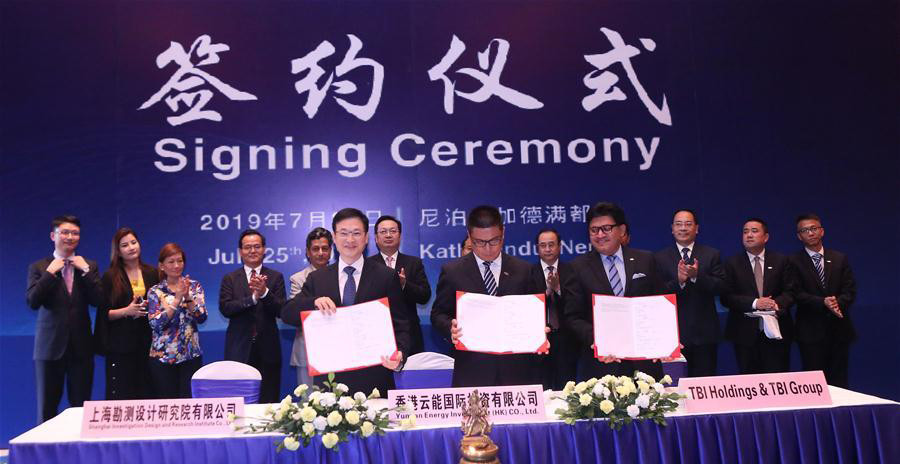Money
Chinese, Nepali firms sign deal to develop Tamakoshi 3 scheme
Construction of the 200 MW plant is expected to begin in 2020 and be completed in three and a half years.
Prahlad Rijal
Three years after Norwegian utility Statkraft backed out from the Tamakoshi 3 hydropower project amid a geo-political rift between Nepal and its southern neighbour, two Chinese and one Nepali company have decided to jointly pour in around $500 million to develop the plant.
China's YEIG International, Shanghai Investigation, Design and Research Institute and Nepal's TBI Holdings chaired by current Non-Resident Nepali Association President Bhaban Bhatta inked a joint venture development framework in the presence of the energy minister and Chinese bureaucrats in Kathmandu on Thursday.
According to Bhatta, a framework agreement has been signed as an in-principle accord to jointly pledge $500 million for the project. “We are yet to finalise the detailed studies and designs of the power plant,” Bhatta told the Post.
A Xinhua report quoted TBI Holdings as announcing its plan to develop the project with an installed capacity of 200 MW, and begin construction in early 2020 and complete it in three and a half years. Initially, the project’s installed capacity had been fixed at 650 MW.
Officials at the Energy Ministry say they are unaware of any developments as such. “We do not know about the agreement, and if the project has acquired a generation licence and changed the project structure with permission from the Department of Electricity Development,” said an anonymous ministry official. “No updates have been relayed to the ministry yet.”
In 2007, the Nepal government and Statkraft had entered into an agreement to build the plant. The Norwegian utility had completed requisite studies pouring in Rs1 billion to build the 650 MW plant. However, the Norwegian state-backed company dropped its plans to develop the export oriented project against the backdrop of the fragile political situation between Nepal and India after the 2015 economic blockade.
Given that, Investment Board Nepal, exercising its rights over hydel schemes above 500 MW, decided to develop Tamakoshi 3 under a public-private-partnership model with a mix of domestic and international investment. The Investment Board had even laid out plans to go for global competitive bidding in 2018.
But in October 2017, the Energy Ministry issued a survey licence to TBI Holdings a day after the company filed an application at the Department of Electricity Development, before the Investment Board could execute its plan.
Acting on a writ seeking a stay order against the government’s decision to award the project to TBI Holdings without competitive bidding, the Supreme Court ordered the government to suspend the survey licence issued to TBI in 2017, a month after it received the permit.
In the writ, the Energy Ministry was accused of violating the Public Procurement Act, Investment Board Act, Good Governance Act and other constitutional provisions by awarding the survey licence directly to TBI Holdings.
At the time, the Investment Board was the sole implementing agency with the right to carry out global bidding for hydel plants above 500 MW.
In a surprise reversal, the Supreme Court—a month after its order seeking cancellation of the survey licence issued to TBI Holdings—quashed its order paving the way for the company to go ahead with the preparatory studies to develop the project.
Officials at the Investment Board are also supporting the idea of implementing the project, but say that it must move ahead by remaining within legal bounds. “No matter who implements it, the project must move ahead, and the work must be carried out legally,” said Maha Prasad Adhikari, chief executive officer of Investment Board Nepal.




 20.12°C Kathmandu
20.12°C Kathmandu














